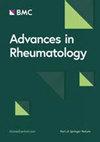慢性背痛不会影响低收入人群的 COVID-19 结果--一项回顾性观察研究
IF 2
4区 医学
Q3 RHEUMATOLOGY
引用次数: 0
摘要
慢性背痛(CBP)是导致残疾生活年限的一个主要原因。社会不平等增加了慢性背痛的发病率和负担。在 COVID-19 大流行期间,非药物治疗和户外活动受到限制,从而影响了对 CBP 的管理。确定 CBP 在 COVID-19 患者中的患病率,以及 CBP 对低收入人群 COVID-19 结果的影响。对巴西塞阿拉州福塔莱萨地区 UNIMED 医院(HRU)2020 年 5 月至 2021 年 3 月期间确诊为 COVID 的患者进行回顾性队列研究。数据包括合并症和家庭收入。在 1487 名患者中,有 600 人(40.3%)被归类为 CBP 患者。CBP 组和非 CBP 组的平均年龄和收入相似,但 CBP 组中女性较多。高血压和哮喘在 CBP 患者中发病率较高,但糖尿病患者不多。无论是否患有 CBP,急诊、住院和入住重症监护室的需求都相似。呼吸困难在 CBP 组和非 CBP 组中更为常见,分别占 48.8% 和 39.4%(P = 0.0004)。在 COVID 之前患有 CBP 不会影响低收入人群 COVID 患者的急性临床结果。本文章由计算机程序翻译,如有差异,请以英文原文为准。
Having chronic back pain did not impact COVID-19 outcome in a low-income population – a retrospective observational study
Chronic back pain (CBP) is a major cause of years lived with disability. Social inequalities increase the prevalence and burden of CBP. Management of CBP was affected by restricted access to non-pharmacological treatments and outdoor activities during COVID-19 pandemic. To determine the prevalence of CBP among patients with COVID-19 as well as the impact of having CBP in COVID-19 outcome in our low-income population. Retrospective cohort of individuals with confirmed COVID diagnosis from May 2020 - March 2021, at Hospital Regional UNIMED (HRU) in Fortaleza, Ceará, Brazil. Data included comorbidities and household income. Among 1,487 patients, 600 (40.3%) were classified as having CBP. Mean age as well as income were similar in CBP and non-CBP groups, with more women in the CBP group. Hypertension and asthma, but not diabetes, were more prevalent in those with CBP. Need for emergency care, hospitalization, and admission to intensive care unit were similar regardless of having CBP. Dyspnea was more common in CBP vs. non-CBP groups, with 48.8% vs. 39.4% percentages, respectively (p = 0.0004). Having CBP prior to COVID did not impact the acute clinical outcome of COVID individuals of a low-income population.
求助全文
通过发布文献求助,成功后即可免费获取论文全文。
去求助
来源期刊

Advances in Rheumatology
Medicine-Rheumatology
CiteScore
4.00
自引率
4.30%
发文量
41
审稿时长
53 weeks
期刊介绍:
Formerly named Revista Brasileira de Reumatologia, the journal is celebrating its 60th year of publication.
Advances in Rheumatology is an international, open access journal publishing pre-clinical, translational and clinical studies on all aspects of paediatric and adult rheumatic diseases, including degenerative, inflammatory and autoimmune conditions. The journal is the official publication of the Brazilian Society of Rheumatology and welcomes original research (including systematic reviews and meta-analyses), literature reviews, guidelines and letters arising from published material.
 求助内容:
求助内容: 应助结果提醒方式:
应助结果提醒方式:


